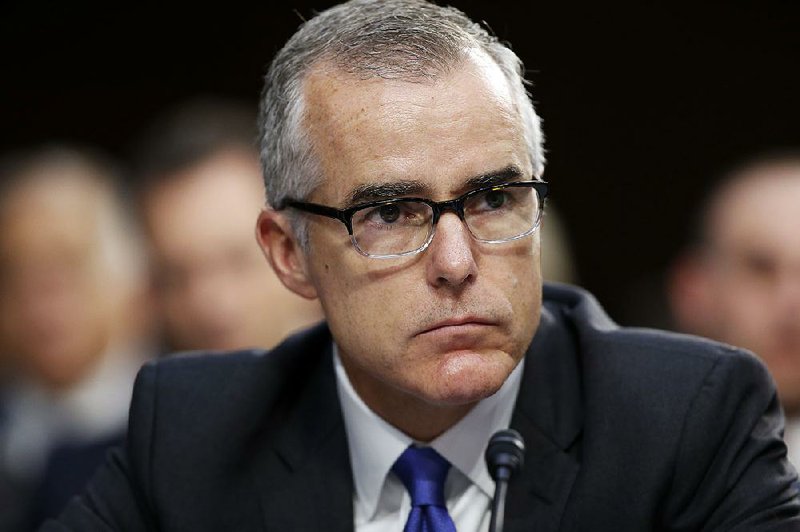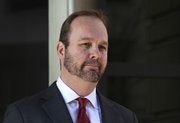WASHINGTON -- Republicans and Democrats are scrambling in the final days of 2017 to establish their narratives on multiple Russia investigations and the integrity of the investigators, in a partisan messaging battle that has intensified as special counsel Robert Mueller has appeared to focus more intently on President Donald Trump and his inner circle.
Congressional Republicans, who have endured almost a year's worth of speculation and investigations into Trump's ties to Russia, are said to be hoping to move on in 2018, are renewing their focus on Democrat Hillary Clinton and have been stepping up their criticism of Mueller. Democrats remain focused on Trump and are expected to push to keep congressional investigations on Russia going well into the new year.
Typifying the partisan rancor surrounding the investigations, House Democratic leader Nancy Pelosi pressed Speaker Paul Ryan on Friday to keep the House Intelligence Committee's investigation intact.
"Political haste must not cut short valid investigatory threads," Pelosi asserted in a letter to the Wisconsin Republican. "Key questions about foreign interference in our elections remain, and must be thoroughly investigated," she wrote.
[RUSSIA REPORT: Documents on Russian interference in election ]
Ryan spokesman AshLee Strong responded by saying Pelosi should want the investigation to end in time for the committee to make recommendations before the next election.
"Whether it concludes next month, next year or in three years, she will say it is too soon," Strong said.
Ryan appoints members of the intelligence committee and could pressure the panel to extend the investigation. But he has largely stayed away from discussing it.
Separately, more than 40 former U.S. attorneys and former Republican lawmakers and officials Friday went to the defense of Mueller's probe.
In a pair of letters, the groups say Mueller and his team must be allowed to continue their work unimpeded.
The 22 former U.S. attorneys, who served under presidents from Richard Nixon through Barack Obama, say it is "critical" to the "interests of justice and public trust to ensure that those charged with conducting complex investigations are allowed to do their jobs free from interference or fear of reprisal."
Seeking Mueller's removal "would have severe repercussions for Americans' sense of justice here at home and for our reputation for fairness around the world," they wrote in a letter to Trump that was coordinated by Georgetown Law's Institute for Constitutional Advocacy and Protection.
Another letter, signed by 20 former Republican members and other former U.S. officials, says efforts to discredit Mueller's work "undermine the institutions that protect the rule of law and so our nation."
"We urge the Administration, members of Congress on both sides of the aisle, and the American public, to support the work of Special Counsel Mueller to its conclusion, whatever it may be," reads the open letter signed by officials including former Defense Secretary Chuck Hagel, former State Department counselor Eliot Cohen and former George W. Bush administration ethics lawyer Richard Painter.
SHIFT TO CLINTON
Republicans this week turned the focus back to Clinton as two committees began conducting interviews in a new investigation of the FBI and its 2016 inquiry into Clinton's email server.
The House Judiciary, and Oversight and Government Reform committees spent hours meeting privately with Deputy FBI Director Andrew McCabe, who was involved in the email investigation. It was the second time this week that McCabe has met privately with lawmakers.
Republicans claim there is anti-Trump bias within the ranks of the FBI that could have affected the Clinton probe. Democrats are accusing the GOP of diversionary tactics and say their criticism could embolden Trump to take steps to fire Mueller.
"This is a fight for the soul of our democracy," said Rep. Elijah Cummings of Maryland, the top Democrat on the oversight panel. "Nothing less."
Sen. Mark Warner of Virginia, the top Democrat on the Senate Intelligence Committee, on Wednesday warned Trump not to take any action relating to Mueller. He said Thursday that he made the remarks, in a speech on the Senate floor, because the "tone and tenor" coming from the White House and its allies "should send a chill through all of us."
Trump and White House officials have insisted in recent weeks that the president has no intention of firing Mueller, a decision that would likely be up to Deputy Attorney General Rod Rosenstein, who appointed the special counsel. That is a change from earlier this year, when the president was openly critical of Mueller.
Some Republicans claim the Democrats' push-back is disingenuous, given Trump's recent words.
"I think it's a lot of posturing, and I think it's a lot of trying to scare people that the boogeyman is out there and he's certainly going to come get us, when that doesn't seem to be the focus at all from the White House," said Sen. James Lankford of Oklahoma, a member of the Senate Intelligence Committee.
Like many Republicans, Lankford said he doesn't think Mueller should be removed, though he says he has concerns about bias at the FBI since hundreds of text messages were revealed between an FBI counterintelligence agent and an FBI lawyer criticizing Trump. Both had at one point been assigned to Mueller's investigation, which has already resulted in charges against four of Trump's campaign advisers.
Both the House and Senate intelligence panels have spent most of the year investigating Russian interference in the 2016 elections and whether Trump's campaign in any way colluded with the Russians. While the more bipartisan Senate probe is expected to continue well into 2018, House Republicans conducted some of their final interviews this week and are hoping to release a report early next year.
Democrats say Republicans are rushing the conclusion of the House investigation, arguing that there are more witnesses to see and documents to obtain. Rep. Adam Schiff of California, the top Democrat on the intelligence panel, has compared the investigation to the GOP-led probe of the 2012 Benghazi attacks, which killed U.S. Ambassador Chris Stevens and three other Americans. That investigation, which centered on then-Secretary of State Clinton, lasted more than two years.
As lawmakers grilled McCabe on Thursday, Democrats left the meeting in frustration. Republican lawmakers had called him in with 48 hours' notice -- sending a letter to him Tuesday evening as he was wrapping up a separate eight-hour interview with the House intelligence panel. McCabe was involved in the Clinton investigation and was acting FBI director when Mueller was appointed to investigate the Russian interference. He has since been replaced by FBI Director Christopher Wray.
Rep. Raja Krishnamoorthi of Illinois, a Democratic member of the oversight panel who attended the McCabe interview, said he believes the investigation into the FBI's handling of Clinton matters is an effort to slow down Mueller.
"I sense that this investigation is at a fever pitch at this point," Krishnamoorthi said of the House Clinton probe. "And I'm not really sure they're looking for answers."
House Judiciary Chairman Robert Goodlatte, R-Va., said the meeting had nothing to do with impeding the special counsel's investigation.
"It's the first of many interviews as part of the [Clinton] investigation," Goodlatte said. "It has nothing to do with the other."
BANNON, LEWANDOWSKI
Some developments were made in the probe this week, with the House Intelligence Committee asking Trump's former chief strategist Steve Bannon and his former campaign manager Corey Lewandowski to testify in early January.
The committee hasn't yet received a response from either Bannon or Lewandowski. The invitation, which didn't come in the form of a subpoena compelling them to testify, was for a "voluntary interview" in the committee's offices, which means it would be held privately, according to an official familiar with the panel's schedule.
The letter doesn't lay out specific reasons the committee wants to interview them or the questions the panel wants to pose, but it makes clear that the interviews are part of the Russia investigation.
Bannon, who worked as Trump's top strategist during the campaign and for several months in the White House, hasn't been publicly accused of any wrongdoing.
Bannon was a key member of Trump's team when the president fired national security adviser Michael Flynn and FBI Director James Comey.
Lewandowski was fired as campaign manager June 20, 2016, and replaced by Paul Manafort, who has been indicted on money laundering charges by Mueller.
Before Lewandowski left, he was among several senior Trump campaign officials who received communications from foreign policy adviser George Papadopoulos about his outreach to the Russian government, according to published news accounts.
The Washington Post reported last month that court filings show Papadopoulos wrote to Lewandowski several times to let him know that the Russians were interested in forging a relationship with the campaign.
The Post said that included one message in May 2016, in which Papadopoulos forwarded to Lewandowski an offer of "cooperation" from a Russian with links to the Ministry of Foreign Affairs.
"Is this something we want to move forward with?" he asked. There was no indication of how Lewandowski responded, wrote the Post. Lewandowski has said publicly he doesn't recall whether he received emails from Papadopoulos, who pleaded guilty in early October to lying to federal agents about his outreach to Russia.
On Friday, U.S. District Judge Amy Jackson summoned former presidential adviser Rick Gates, on house arrest in the federal Russia probe, and his lawyers to court Wednesday to explain why the accused shouldn't be held in contempt for violating her gag order imposed on everyone connected with the case.
Jackson wants to know why Gates appeared by video at a fundraiser for his legal defense fund.
Jackson told Gates to explain why "his reported personal participation in the creation of a fundraising video to be shown to journalists and disseminated on social media, in which, according to multiple press accounts, defendant makes reference to 'the cause' and the goal of 'ensuring that our supporters from across the United States hear our message and stand with us,' would not violate this Court's order."
It's the second time Jackson has dealt with unexpected public pronouncements by the first individuals indicted in Mueller's wide-ranging criminal investigation. Earlier, she was told that Manafort, Gates' co-defendant, had secretly co-authored a glowing commentary article that was published in an English-language newspaper in Ukraine.
The video in which Gates appeared was aired Tuesday at an event hosted by lobbyist Jack Burkman. Burkman is known most recently for promoting a conspiracy theory alleging that the death of former Democratic National Committee staff member Seth Rich was part of a cover-up by Clinton.
In the video, Gates said: "By being here tonight, you are giving us the tools that we need to fight. And for that I am extremely grateful."
Gates seemed to be sensitive to the existence of the gag order, mentioning it briefly in the video.
"As you may be aware, there is a gag order on the case, so I am not able to talk specifically about the case. However, I can say that because of people like you we will have the resources to fight."
Information for this article was contributed by Mary Clare Jalonick, Tom LoBianco and Jill Colvin of The Associated Press; and by Billy House of Bloomberg News.
A Section on 12/23/2017


